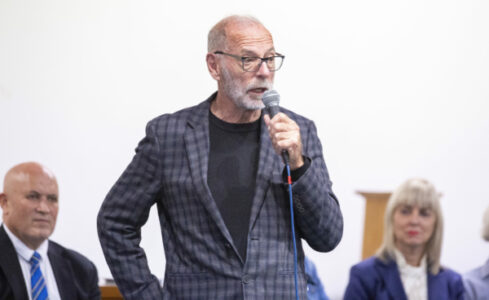
By Laura Kvigstad, Auckland Council reporter
Funded by New Zealand on Air
The hole in Auckland Council’s budget grew again and Mayor Wayne Brown says it could still get worse.
At the Governing Body meeting on November 24, members received an update on the council’s finances as a further $25 million deficit from a change to the Official Cash Rate brought the total to $295m.
Cr Chris Darby asked for clarity on whether the budget deficit may grow by another $20m.
Chief financial officer Peter Gudsell responded that the reserve bank signalled they would continue to “tighten”.
“If they are not getting the impact that they desire from the Official Cash Rate tightening, they have signalled that they will continue to tighten,” Gudsell said.
“I was asked last time whether I saw $270 (million) was it. I still don’t have a crystal ball. We are all in this situation of having to wait and see whether the interventions work.”
Cr Julie Fairey said she was concerned that labour and material shortages impacting on the budget were less to do with Covid-19 and instead were “baked into the system”.
“Is this a new normal? That is one of the things I worry about, we think ‘oh well actually this is just a short-term thing and sooner or later those labour and material shortages will sort of sort themselves out’ but they have been going on a few years,” Fairey said.
Gudsell alluded to his crystal ball again and said it was difficult to say whether the shortages were medium or short-term problems.
He said they could be addressed through early contractor involvement, less reliance on contractors and encouraging policy changes around the immigration border.
“It is fair to say that we have had the same impact for two or three years now. It does seem to me that it is it is likely to remain the case until that unemployment rate starts to move as well.”
Cr Richard Hills said this budget could be worse than council’s emergency budget during the first Covid lockdown.
Referencing the Reserve Bank governor, Hills said, “There is a continual competition for people, for staff. Salary and wage hikes are obviously driving part of the inflation story.”
He said council had a three-fold problem currently by holding recruitment, the wage competition pricing council out and staff being poached by those who could afford to pay more.
“We can’t compete. right now is that an issue that we are thinking about?”
Chief executive Jim Stabback said council had to balance paying staff while delivering essential services for Aucklanders.
“We are competing in a market with low unemployment and high competition for the right resources so that is the reality of the situation,” Stabback said.
Stabback said council had given large discounts on consenting because a shortage of skilled labour meant applications could not be completed in time.
“A lack of staff in one area is losing us potentially millions of dollars because of consent discounts.”
In a press release put out during the committee, Brown again confirmed that double digit rates rises of 13 per cent would not happen under his leadership.
“It is by far the biggest fiscal hole in Auckland Council’s history, except for the once-in-a-hundred emergency budget when our city was put into lockdown,” Brown said.
“We aim to keep rates rises below inflation to reduce the pressure on Aucklanders now being hit by the economic and fiscal storm I warned about through the campaign and since becoming Mayor. It could still get worse.”
Brown said council’s Expenditure Control and Procurement committee was currently looking for savings while also “trying not to squeeze Aucklanders more during a cost-of-living crisis”.
Monthly updates on the state of Council’s finances will be ongoing across the next term.









